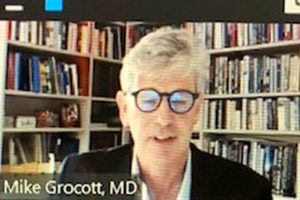
Michael P. Grocott, MBBS, MD, FRCA, FFICM, FRCP
The Choosing Wisely campaign continues to bring improvements to health care and even shape today’s medical students who will carry out the campaign’s mission well into the future. The state of the global initiative, now eight years strong, was the focus of the Sunday session “Choosing Wisely in 2020: A Global Perspective.” The session was moderated by Michael P. Grocott, MBBS, MD, FRCA, FFICM, FRCP, of the University of Southampton in the U.K.
Choosing Wisely was launched in 2012 by the American Board of Internal Medicine (ABIM) Foundation. It is designed to advance a national dialogue on avoiding unnecessary medical tests, treatments, and procedures. Speakers from three of its largest partners – the U.S., Canada, and the U.K. – addressed the campaign’s implementation in their countries and its impact to patients and physicians.

Daniel Wolfson, ABIM Foundation Executive Vice President and COO
“I think our foreign partners have knocked it out of the park,” ABIM Foundation Executive Vice President and COO Daniel Wolfson told session attendees when discussing the global implementation of the campaign over the years. “The campaign continues to appeal to other nations because of its simplicity and its physician-led focus on safety and to do no harm.”
In reviewing the campaign’s history, Wolfson said its framework of multi-component system interventions has been the most effective outcome of the campaign. In fact, he said, disseminating information without physician feedback will not provide good results.
That same framework has been used to launch Choosing Wisely’s newest initiative, Building Trust. The effort underscores the importance of trust between the patient and physician and operates on the same core principles of good information, science, evidence, and patient engagement, he said.

Kyle Kirkham, MD, FRCPC
In Canada, Choosing Wisely is alive and well, and organized to drive change, according to Kyle Kirkham, MD, FRCPC, of the Women’s College Hospital in Toronto, Ontario. Similar to Choosing Wisely in the U.S., Canada’s campaign has chosen to focus on five preoperative recommendations to build its framework. As such, it’s implementation guide focuses on appropriate testing for patients getting low-risk surgery, anesthesiologists being more visible outside the OR (engaged in and leading change), the right number of patient visits to the preoperative clinic to enable appropriate testing, more efficient use of resources and a changed institutional culture with respect to ordering tests, and becoming more patient-rather-than-procedure oriented, he said.
“We know practice varies,” Dr. Kirkham said, “but implementation has to have the support of an integrated network of societies in local jurisdictions to be effective.”

Ramai Santhirapala, MBBS, FRCA, FFICM, FHEA
Similarly, the U.K. has created its own set of priorities within the global Choosing Wisely framework. Ramai Santhirapala, MBBS, FRCA, FFICM, FHEA, of Guy’s and St Thomas’ NHS Foundation Trust in London, said her country’s approach has been to focus on decision-making based on the patient’s wants and needs. Santhirapala shared her own story of a hand injury with differing “surgery/no surgery” physician opinions as well as her personal considerations.
“I had to think about what was important to me. This leads to a much greater discussion about who decides whether to operate or not,” she said. “Decision-making is a process of science and the art of understanding the patient – listening to what that patient says and doesn’t say.”
For example, she said, the U.K.’s approach to elective surgery is that day surgery should be considered the default for many elective procedures, and physicians should share this information with patients to guide them in the decision-making.
The U.K.’s approach led to the common language it created for its Choosing Wisely campaign – BRAN. The acronym represents the Benefits, Risks, Alternatives, and doing Nothing when considering a patient’s surgical decision-making, she said.
Time has only strengthened the Choosing Wisely campaign across the globe. Today, according to Wolfson, the trickle-down effect is reaching medical students and changing mindsets for the future.
“In America, we are graduating a different kind of student who thinks about systems in different ways. That is one of our high points,” Wolfson said.
Return to Index